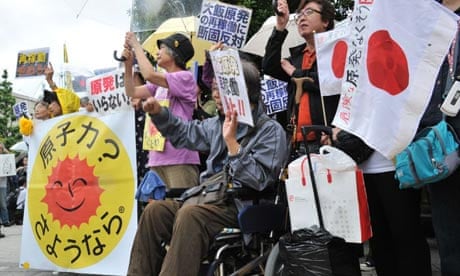Japan is to resume the use of nuclear power for the first time since last year's triple meltdown at Fukushima Daiichi power plant after the government on Saturday approved the restart of two idled reactors.
The decision to restart reactors three and four at Oi power plant in western Japan could pave the way for the resumption of operations at other atomic facilities, amid concern over power shortages during peak demand this summer.
The prime minister, Yoshihiko Noda, announced the restart after securing support from the mayor of Oi and the governor of Fukui prefecture, where Oi is located.
"Having won local consent, reactivating [the reactors] is now the government's final decision," Noda said. "We are determined to make further efforts to restore people's trust in nuclear policy and safety regulations."
Japan's last working reactor was turned off in early May, leaving it without nuclear power for the first time in more than 40 years.
Four reactors at Fukushima Daiichi were destroyed by the 11 March 2011 tsunami and another 50 around the country were taken offline for regular maintenance. Oi is the first plant to pass simulation "stress tests" introduced last year to address public concern over safety.
Noda has pushed hard for the Oi restart under pressure from the powerful business lobby, which feared disruption to manufacturers. He was expected to give approval after the mayor of Oi, Shinobu Tokioka, gave his backing to the move earlier this week. Tokioka said nuclear safety experts had convinced him the plant could withstand a natural catastrophe similar to the one that struck Fukushima Daiichi.
He added that he was concerned about the effect prolonged closure would have on the local economy and the prospect of power shortages in the Kansai region of western Japan, home to 24 million people and with an economy the size of Australia's.
About 10,000 demonstrators gathered outside Noda's office on Friday night in last-ditch attempt to derail the restart. Anti-nuclear campaigners accused the prime minister of rushing into a decision and ignoring lingering concerns over safety. "Prime minister Noda's rushed, dangerous approval of the Oi nuclear power plant restart ignores expert safety advice and public outcry, and needlessly risks the health of Japan's environment, its people and its economy," said Junichi Sato, executive director of Greenpeace Japan.
"Japan has already survived the peak summer and winter energy demand periods once with little nuclear power online, as well as a full month with none, and despite continued fear-mongering statements from industry and government about the need for restarting Oi, the economy has still grown remarkably well and there have been no significant energy shortages."
The operator of the Oi plant, Kansai Electric Power (Kepco), had warned that the region would face a 15% electricity shortfall in July and August, and had urged consumers to make power savings.
But the trade and industry minister, Yukio Edano, warned against wastefulness, as it will take Kepco about six weeks to bring both reactors to full capacity. "Safety is our main concern," he said. "It will take some time for the reactors to begin generating electricity, and we request that people continue to save energy. If there are safety problems, the process could be delayed."
The government did not require local approval, but Noda and a small team of ministers have spent weeks attempting to win support from residents amid widespread fears over safety and a loss of trust in the nuclear industry in the wake of the Fukushima accident.
The Japanese public remains divided over nuclear power, more than a year after the Fukushima Daiichi meltdown sent radioactive materials into the atmosphere and forced the evacuation of tens of thousands of residents.
According to a nationwide poll by the Mainichi Shimbun newspaper earlier this month, 71% of people cautioned against a rush to restart the Oi reactors, while 25% supported Noda's stance.
Noda has vowed to lessen Japan's dependence on nuclear power and increase the role of renewables. Nuclear once provided about a third of Japan's electricity, but plans to increase that share to more than 50% with the construction of more reactors was scrapped after the Fukushima Daiichi meltdown.




